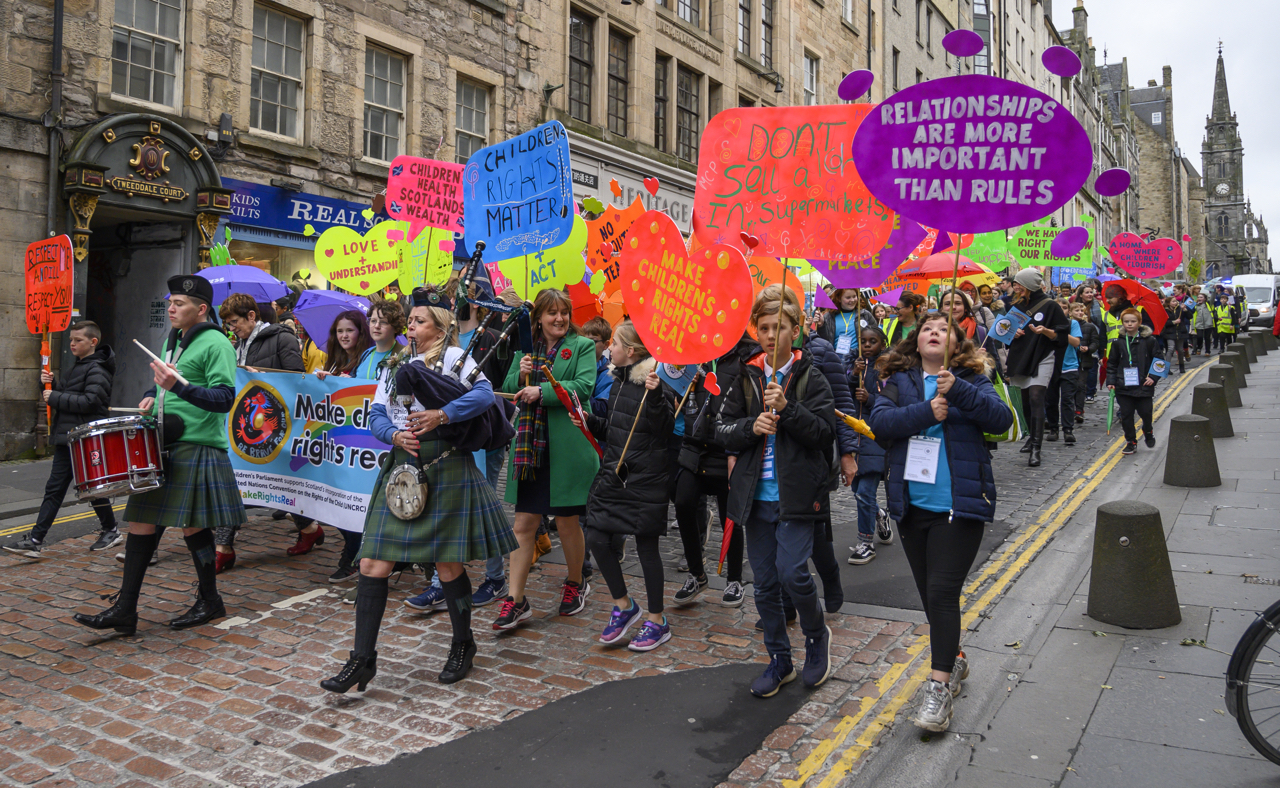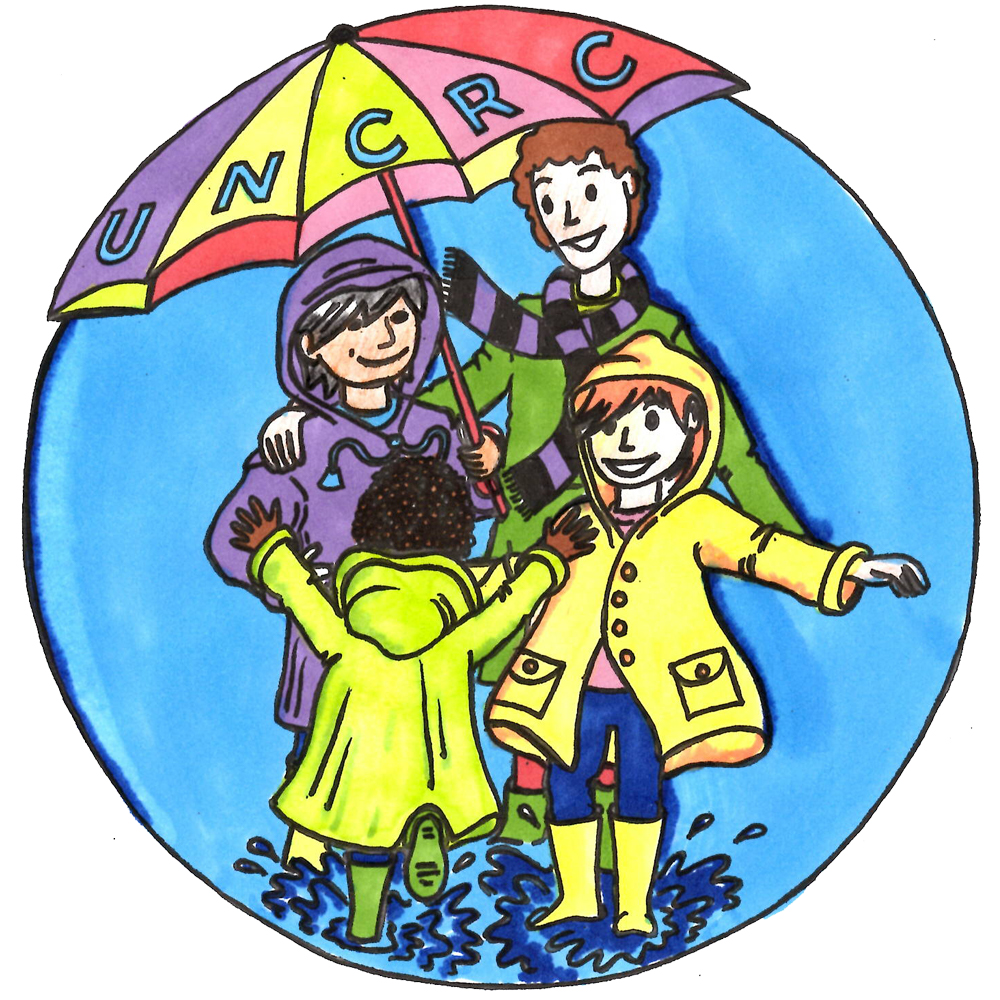
Winning Hearts and Minds in the Year of Childhood

How we got here
1992, Assembly Rooms, Edinburgh: twelve children from Niddrie and Craigmillar are taking part in a residential project with another thirty children aged 9-14 from Denmark, Norway and Germany. Their task: to create a 8m x 8m model of an environmentally-friendly city of the future; a city that meets the needs of everyone who lives there. The children were aided by a team of architects, urban designers, artists and children’s workers whose role was to support the children to translate their ideas on to their model. ‘Enviroville’ as the children named this city, respected both people and place. River taxis replaced cars, organic vegetable farms provided local employment and healthy food choices. Scottish children put chimneys on top of their new housing until the horrified Norwegian children explained what fossil fuels do to the environment. The chimneys disappeared to be replaced by solar panels and an enterprising idea: appreciating the high cost of land, the children recognised that graveyards take up a lot of space and so the volcano found another purpose as a natural crematorium which, handily, then generated more energy that could be used to heat houses.
There was the obligatory chocolate factory for both treat and employment purposes, an old people’s home where one side faced a children’s nursery because “not all old people don’t like children and some of them might miss their grandchildren and like to see children playing”. And there was a children’s parliament because ‘we need somewhere adults take us seriously and listen to the things children think are important, not just what adults think are important”.
And so here we are, 28 years later with a Children’s Parliament that takes children seriously and enables children to share their views and experiences with influencers and decision-makers.
Children’s Parliament was officially established as a charity in 1996. The UK government had ratified the United Nations Convention on the Rights of the Child in 1991 and we created the 6 themes that would frame our work to cover all the Articles of the Convention:
- Who we are
- Where we live
- Health and happiness
- Freedom
- Feeling safe and being cared for
- Having our say
Putting children’s human rights in law
There are reasons for a double celebration in 2021. As well as being Children’s Parliament’s official 25th birthday, it is also the year The Scottish Parliament is expected to incorporate the UNCRC into Scots law. This will see Scotland join a small group of countries which recognise the power of incorporation and the opportunities it brings to transform the lives of children, families and communities.
The Scottish Government is to be congratulated for its commitment to creating a robust Bill which is arguably the most important piece of legalisation to come before The Scottish Parliament. Yet, as we find ourselves on the brink of historic legislation, we find that we have a great deal of work ahead of us to bring professional and civic Scotland behind it and bring it alive.
The power of leverage
As we desperately seek ways to address the many entrenched and challenging issues that test us daily, from mental health, poverty and abuse to educational attainment and the impact of trauma, we see the increase in initiatives. While there is no doubt many of these initiatives offer useful perspectives or help children with specific challenges, they fail to help reset our thinking and behaviour in order to root work in policies and practices that prevent these issues from becoming issues in the first place. Of course, some families will always struggle and there will always be children who will need additional specialist support, but while we allow the initiative culture to thrive, we are doing little to address the root cause of why these issues have become problems in the first place.
For too many, children’s rights remain a niche endeavour, a mystery, an add-on, not a priority. Yet there is no environment or circumstance or initiative that wouldn’t be improved or increase its power and impact by being framed and rooted in the UNCRC.
Children and the power of power
Uniquely and critically, embedding a children’s rights approach gives children power.
Power to acquire knowledge – to know that you have human rights and what they mean for you as a child in your own home, school and community.
Power of agency – to know that if your rights are breached you are expected to do something about it and will be listened to and taken seriously.
I am routinely surprised and disappointed at how infrequently children are able to articulate what children’s rights mean to them in their daily lives. When asked the question, children’s responses are often couched in the context of global rights – the right to shelter, to food, to not be kidnapped or fight in a war. All are important of course but being forced to fight in a war isn’t often at the top of the list of concerns for a child growing up in Scotland. Having enough food, being warm in your home, being protected from abuse, having a say about what happens to you, these matter to our children. Contrary to the belief of some who think the UNCRC is a charter for children to make demands and get more of what they want, it is the rights of families that are at the heart of the UNCRC, rights to ensure that the State provides the support families need to ensure children’s rights are recognised and fulfilled and that children have opportunities to flourish. Critically, the new legislation gives children and their representatives the power to take cases to court when their rights are breached. The aim is not to see a rise in court cases but for adults to establish a framework of accountability that ensures systematic and effective processes are developed which listen and respond to issues raised by children and their families. The ultimate prize will be the recognition of our need to reassess the environments in which children grow up in order to reassert children’s place in society as equal citizens with human rights and agency.
Scotland’s relationship with children
You might wonder, if embedding children’s human rights is so transformational, then why isn’t everyone jumping on it? I would suggest a number of reasons.
In Scotland we tend to view children from a welfare perspective. We successfully raise money to buy needy children Christmas presents and organise ‘treats’ like the Edinburgh taxi drivers’ wonderful annual trip for children with disabilities. We put great effort and resource into dealing with the impact of trauma but spend little time thinking about how we can reduce children’s vulnerability and exposure to harm in the first place. Children are essentially not seen as equal citizens whose agency should be enabled and supported. We wait for issues to appear then throw resources at a problem that could often have been prevented from arising in the first place. We expect our young adults to be able to successfully navigate their way in the world, yet we fail to recognise that preparation for adult life begins in our earliest days. The ability to communicate well, negotiate, compromise, challenge, take responsibility and make positive decisions don’t magically appear when we turn 18, they are inculcated in our everyday experiences from birth.
If we recognised the value and importance of childhood, we would quickly recalibrate our expectations. One example is our struggle with the ‘attainment gap’ and our expectation that children should begin formal education at 4 or 5, despite an avalanche of international evidence that shows this approach harms children. Children learn and thrive through relationship focused, play-based experiences and begin to be ready to move into more formal learning environments at the age of 6 or 7. The evidence is overwhelming: children who have this experience do better in terms of long term health and wellbeing and attainment.
What can you do?
First and foremost, if you haven’t yet read the UNCRC, read it here on the wonderful Together (Scottish Alliance for Children’s Rights) website: https://www.togetherscotland.org.uk/about-childrens-rights/un-convention-on-the-rights-of-the-child/ Reassure yourself that the UNCRC sets out the minimum standards our children can expect from us.
Unfearties
We were taken aback in 2017 when our Unfeartie idea took off much more quickly than we anticipated. We weren’t able to harness that interest and so we are making our Unfeartie network a priority during Year of Childhood. Look out for how we plan to do that in the weeks to come. https://www.childrensparliament.org.uk/?s=Unfearties
The Year of Childhood
To mark the significance of 2021 and harness the excitement around incorporation, Children’s Parliament is hosting a ‘Year of Childhood’ which will run from January – December 2021. Everyone has an investment in making childhood the best it can be; it’s the time when long term health and wellbeing outcomes are established and where habits of a lifetime begin. We want to demonstrate and amplify the many wonderful people and places where work to realise children’s human rights is taking place. The Year of Childhood will bring together parents, carers, professionals and civic society in a year long amplification and celebration of children’s human rights. Through films, blogs, webinars and events – when we’re allowed – we will get together to highlight the transformative opportunities embedding children’s human rights affords us. It will be joyful, positive, inspiring and occasionally challenging.
The Year of Childhood is a time to step up, to recognise the power a human rights approach brings to children and their families and together work towards building a country that brings children and childhood into the light. This is a time for people from across Scotland, from all backgrounds, who care for or work with children as much as it is for those whose only contact is to glimpse children passing their door on their way to school. Childhood is the most important time in our lives; a time when long term health and wellbeing outcomes are established and where habits of a lifetime are formed.
‘My community is my second family’ said one of our MCPs recently. That’s how important we adults are to children. Please join us – come inside the Year of Childhood and help release the potential the UNCRC offers to make sure every child in Scotland is healthy, happy and safe. More information will be shared as we approach the new year and we look forward to working with you in 2021.

Year of Childhood will run January – December 2021, for more information see www.childrensparliament.org.uk/year-of-childhood/
Cathy McCulloch
Co-Director
Children’s Parliament
November 2020